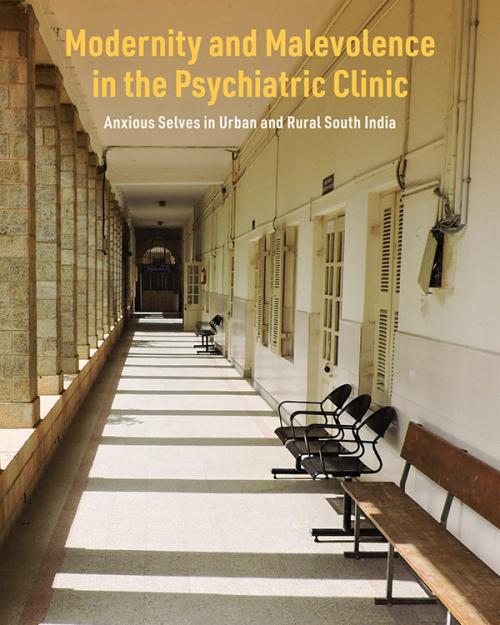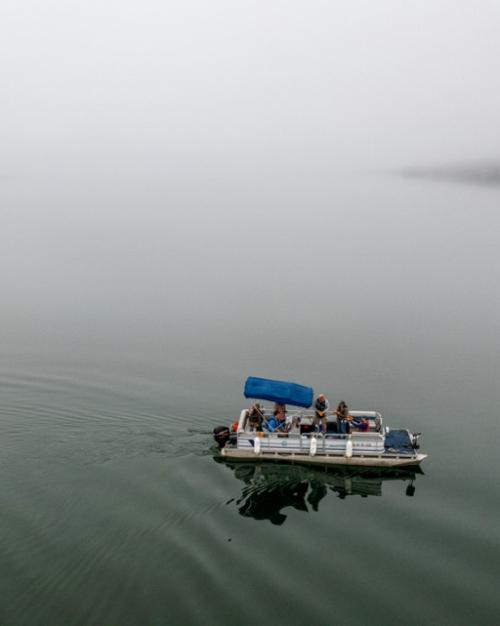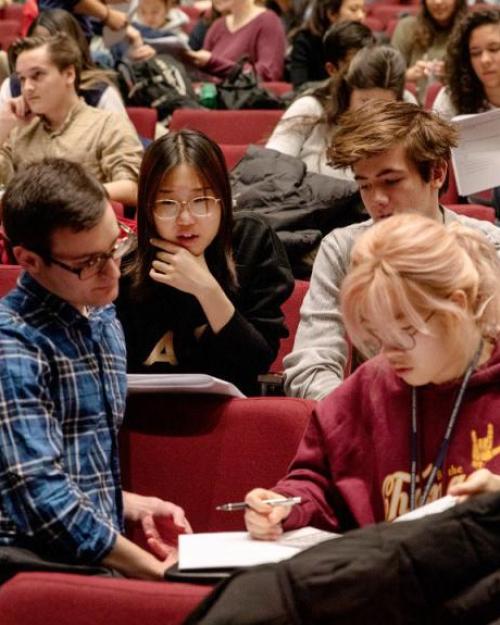Thanks to a grant from the university’s Active Learning Initiative (ALI), the Department of History will transform multiple courses with active learning innovation.
Active learning methods encourage students to engage in their learning by thinking, discussing, investigating, and creating in their courses.
A committee in the department, led by the previous department chair Tamara Loos, wrote the grant proposal. The department's grant supports two postdocs for three years and Josh Schwartz and Wenrui Zhao were chosen from a competitive pool of candidates. They will work on four courses over the course of the grant, with a focus on introductory gateway courses (some with more than 100 students) that attract students from across the university.
Interim Chair of History Lawrence Glickman, the Stephen and Evalyn Milman Professor of American Studies in the Department of History, is enthusiastic about ALI. "Most of us were doing active learning on some scale before the grant, and we wanted to learn more about active learning techniques to do what we were already doing better," said Glickman.
The timing for ALI is good, said Glickman; post-COVID-19, students want more engagement in the classroom after so much time in front of screens in passive participation, and active learning provides that participation.
Showing students the beauty and fun of historical thinking in gateway courses encourages them to pursue a history degree or a history minor (history, history of capitalism, and public history), said Glickman. History is about gaining critical thinking and analytical skills, as our majors and minors discover when taking upper-level seminar courses, noted Glickman.
This past term, Professor Glickman's "Sports and Politics in American History" was one of the five courses targeted for ALI innovation, and he worked on it with Josh Schwartz last term. Cristina Florea's "The Rise and Fall of the Soviet Empire” was the other course targeted; Florea worked with Wenrui Zhao. This spring, both postdocs will work with Durba Ghosh in her “Global History of Love” course.
Tamara Loos, chair of the department 2019-2022 and professor of history (currently on leave), coached Glickman on implementing active learning in his class, she said, "The goal was not to master every element of ALI by checking things off in a box but to have tools available to implement engagement activities and teach students how to be better at critical thinking."
The grant supports all faculty efforts to improve student engagement in introductory classes. This is done through our Teaching Collective, which meets three or four times a term and is open to any faculty and graduate students interested in learning more about active learning and in discussing pedagogy. Schwartz and Zhao take the lead in most of the sessions, but the discussions are open-ended and democratic, with everyone attending sharing their thoughts and experiences.
"For example, one meeting focused on our most successful moments in teaching, and another on our most difficult moments in the classroom. The latter discussion proved remarkably interesting because Wenrui and Josh suggested what we could do in a comparable situation to improve and learn," said Glickman.
At first, some professors were concerned about participating in the ALI initiative because the time allotted for discussions during a lecture results in less coverage of material during the lecture. But in the end, more professors were interested than we had introductory courses, said Glickman.
Postdocs with the Active Learning Initiative from across the university, including ours, meet often to share their experiences and expand their knowledge, which they bring back to the department. Florea and Glickman met with their postdocs at least once a week. Since many activities lend themselves to active learning and the key is choosing what works for the course and the instructor, "I would show Josh what we were going to cover that week, and he would suggest optional active learning activities, many of which we implemented,” said Glickman.
“These weekly meetings,” said Schwartz, “were some of the most fruitful and cooperative pedagogical interactions I have ever had. I think we learned a great deal from each other about how to teach – and beyond that, about how to think about history pedagogy as a whole. Not everything that we tried worked, but on balance, I think we had some real winners – and that students really substantially benefitted from more interaction with us and each other during the lectures.”
Florea said that “working with Wenrui made me think more deliberately about what my teaching goals are and how I can best achieve them. The most helpful aspect of our work together was having an astute interlocutor to point out to me when I was making unwarranted assumptions about what students know or think, and to suggest new ways to engage students more actively in the course. Now that I am teaching on my own again, I find myself really missing Wenrui’s input. “
Florea is now applying many of the strategies she and Zhao devised last semester in the course she is currently teaching, “The History of Eastern Europe” -- from polling to get students brainstorming, to think-pair-share activities to generate discussion, to image and object analysis exercises.
Ghosh reports that things are going well in her “Global History of Love” course. “Wenrui and Josh have helped to redesign two of the assignments that involved collaborations with collections on campus,” she said. “Wenrui, whose research specialty is in early modern Europe, found some Hogarth engravings at the Herbert F. Johnson Art Museum for the students to draw from in understanding desire in early modern England. Josh, who is a modern U.S. historian, has been working with the Human Sexuality Collections to revamp the final paper assignment which calls on students to draw from archival materials available only at Cornell."
Glickman said that teaching assistants, too, learn pedagogical skills for active learning. "I had four teaching assistants,” he said, “and each used active learning and created innovative activities for their discussion sections."
In addition to “The Global History of Love,” the other ALI courses selected are “Subversion as Foreign Policy” which is taught by Ray Craib, Marie Underhill Noll Professor of American History and Tamara Loos, and “The World of Modern Japan,” which will be taught by Professor Kristin Roebuck.
There are many active learning methods In-class polls, particularly for large classes, are frequently used in active learning. These are electronic polls that students can access in class to respond to questions posed by the instructor.
Florea and Zhao also used this tool but in a different way. After the class read “The Queue,” a 1983 novel by Russian writer Vladimir Sorokin, the instructors asked students to use their own words to describe the characteristics of the queue as a collective body. They then projected the answers onto a screen in class as a word cloud. Student answers included "stagnant," "forced-togetherness," "purgatory" and "aimless." The poll proved useful in helping the students articulate their own understanding of Sorokin’s work.
Zhao modeled another active learning method, small group discussions of a chapter or reading passage, at one of the Teaching Collective meetings Florea and Zhao then used the technique in the course "The Rise and Fall of the Soviet Empire": rather than having one discussion with the entire class, they organized small groups to talk about the book with each other. They used the technique again during a lecture on the Russian Civil War. To facilitate students’ empathy with figures in history and encourage them to understand a broad range of human experiences, they put students into small groups, and assigned each group a different historical character, such as a Ukrainian nationalist, a Jewish worker from St. Petersburg, and a widow of a soldier. Each group then discussed and shared with the class what attitudes their historical actor would have toward the Civil War and the Revolution, and what could be their grievances. The instructors said this helped the students to formulate views on complex issues and articulate those views better.
Benefits of active learning are exponential. Solid research shows that students remember more class content by actively engaging in class than if professors had covered "everything" in a lecture format. Rather than rote learning, students make up their own minds given the facts and context of a situation.
“There is sometimes a little bit of anxiety about ‘losing time’ to active learning,” said Schwartz, “but what I think we’re learning is that most of the time both faculty and students gain from incorporating active learning activities. Students retain more information, but even more importantly – and I think we saw this last semester, and are seeing it again, now – active learning helps students conceptualize and ground what each lesson does in relation to a course’s larger themes and objectives.”
Watching the students in the fall, Glickman noticed more active engagement, even among students who might hold back during discussions in lecture courses. Their body language indicated interest. He sees this as a positive way for students to engage more fully with historical material. "Students make sense of the topic and how to look at it better than if you tell students how to think about the material," he said.
Glickman said he’ll be working with Schwartz to assess his ALI experience during this semester to decide what he’ll add to "Sports and Politics in American History" the next time he teaches it.
The department looks forward to hearing more about how the seeds of this intellectual collaboration grow.
ALI is funded by Alex ’87 and Laura Hanson ’87, deans of participating colleges, and the Office of the Provost. It is supported by the Office of the Vice Provost for Academic Innovation and the Center for Teaching Innovation.




